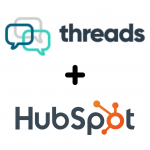
Migrate emails seamlessly
If you are new to HubSpot, one of the first steps may be to move your existing data from your old CRM to HubSpot. Whilst you might think that this is a simple task this is not always the case. A seamless transition is very important to long term usability. Indeed a common challenge is how to migrate emails. The main problem lies with the inability to simply map data from one field to another.
Eliminating the barriers to migration
In fact, the ease with which you can migrate email to HubSpot will depend largely on your legacy system . Most CRM’s do not have their own email client. They probably use an integrated email solution provided by a third party. If this is the case, when you cease using your old CRM, it may not be possible to transfer your historic emails at all.
The risks of losing data
For this reason, you might avoid switching to HubSpot at all. You may consider the risk of losing your valuable data associated with their past emails is too large a price to pay. Alternatively you might simply give up and just decide to start using Hubspot as a blank canvas.
But don’t give up! As well as the known features and benefits of HubSpot, there are also huge advantages for ensuring that your historic email data is imported to HubSpot.
1. Improve User Adoption
![]()
One of the major challenges to CRM adoption remains user reluctance to use a new system. By automatically importing all your historic data into your CRM, users will immediately see the benefits of the new CRM without staring at blank or incomplete records.
Pre-populating your CRM with your historic email drastically increases the chances of successful user adoption. Ensuring your data is available before your users start using the software will improve engagement.
2. Clean Up Your Records
![]()
The move to a new CRM system is a chance for the business to clean up its existing data. It is a good opportunity to exclude redundant or outdated data from the migration. For example, if your business has been running for 10+ years, then perhaps only correspondence from the last 5 years is required.
A decision like this will depend on the nature of your business. Whilst migrating less email may be cost effective, businesses that engage on an infrequent basis with customers will find ‘losing’ historic data problematic.
3. Avoid Errors
![]()
If you decide not to use an automatic tool to import your data, the alternative is todo this manually. Typically, the process involves identifying all the email accounts which might contain relevant emails and then a list of contacts for whom emails should be imported.
For a business with less than 20 contacts then this may not be onerous, but as the number of years of historic data or email accounts increases, this approach can become very expensive not to mention error prone.
How Threads Can Help?

Threads integrates with HubSpot to provide a cost effective and seamless way for your business to migrate emails. By connecting directly to your email client, Threads’ selectively logs both sent and received emails that match your HubSpot contacts on your HubSpot timeline chronologically.
Threads also ensures that you can log emails belonging to ex-employees in HubSpot. It avoids them being forgotten or locked in an inaccessible inbox. To find out more, get in touch today!
